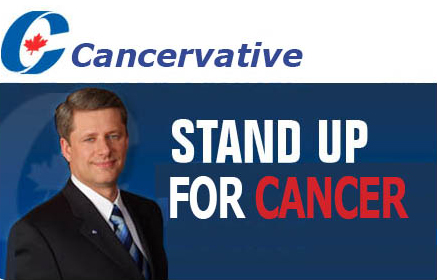The Conservative government is denying chemotherapy to refugees and imposing carcinogenic tar sands on indigenous communities, as part of an oil-driven economy that puts profits above people and the planet. But there are growing movements demanding healthcare and a green future for all.
Healthcare for All
Last spring, Immigration Minister Jason Kenney announced drastic cuts to refugee health. As his parliamentary secretary Rick Dykstra later admitted, “The current reform of the (Interim Federal Health Program) was part of the economic action plan, budget 2012, and was under budget secrecy; therefore, no consultation took place with provincial and territorial governments or medical and health care associations prior to the policy decision being made.”
When health providers found out about the cuts they responded with occupations and protests, and its clear their warnings and actions were justified: the federal Conservatives have denied chemotherapy to a refugee in Saskatoon who has stomach cancer. As Saskatchewan premier Brad Wall said, joining a growing number of provinces denouncing the cuts and covering the costs: “It’s unbelievable that some of the decisions that have been taken federally are having this impact on people who are clearly the most vulnerable, refugees who are obviously fleeing something quite terrible—that’s why they’re refugees.”
The Conservatives claim that previously funded care was excessive and a drain on Medicare. Not only does the denial of chemotherapy show the cruel absurdity of this claim, but it comes at the same time as Prime Minister Harper has refused to meet with premiers to discuss the $36 billion he’s cutting from the Canada Health Transfer (360 times the amount “saved” by cuts to refugee health). Refugee health cuts were designed to deprive care from refugees, and to scapegoat them for broader cuts to Medicare. Protests reversed some of the cuts to the Interim Federal Health Program, but further action is required to restore refugee healthcare and push back against the broader cuts.
No Carcinogenic Tar Sands
While Conservative cuts are denying chemotherapy to refugees, tar sands are imposing cancer on indigenous communities. People in Fort Chipewyan, the community downstream from the tar sands, and their health providers have for years raised the alarm about high rates of rare cancer, which the Alberta Cancer Board finally confirmed in 2009. As George Poitras of the Mikisew Cree First Nation in Fort Chipewyan said back in 2009, “It’s about time that we’re getting these results confirming what we’ve been saying all along.” The Conservatives have tried to ignore front-line communities and cut funding from scientists, but there is a growing indigenous-led movement against tar sands.
In 2009 a delegation challenged Harper at Copenhagen. “Fossil fuel extraction from the tar sands are killing our people with cancer, killing our culture by destroying our traditional lands, and killing our planet with CO2,” said Eriel Tchekwie Deranger, member of the Athbasca Chipewyan First Nation and Tar Sands Campaigner for the Rainforest Action Network. Last year there was a mass protest on Parliament, and this year has seen further momentum against carcinogenic tar sands and their pipelines–including the Yinka Dene Alliance Freedom Train from the west coast to Toronto, the Defend Our Coast sit-in in Victoria, the PowerShift conference in Ottawa, the No Line 9 conference in Toronto, and the Unist’ot’en eviction of pipelines (which has called for solidarity actions next week).
Good Green Jobs Now
The “economic action plan” that brought cuts to refugee chemotherapy, and the tar sands bringing cancer to indigenous communities, claim to provide the economic benefit of jobs. But the fossil fuel industry is one of the least efficient job creators, and the jobs it creates undermine the health of workers and the long-term health of the planet on which we all depend. Instead, we need good green jobs, as Jim Britton, Regional Vice President of CEP (the union representing tar sands workers) said in the lead up to the Victoria sit-in:
“We will be coming to Victoria not just to oppose Harper’s vision of an economy based on exporting raw bitumen but to propose a very different economic vision for our country. We want a transition from dependence on fossil fuels that is fair to the workers in the sector, as well as a national energy strategy that includes good green jobs and long term energy security to Canadians.”
According to a recent study there are much higher rates of breast cancer in women working in the auto plastics industry, part of the broader oil economy tied to the tar sands. But the movement against tar sands is starting to unite the labour movement with indigenous and environmental movements. As Susan Spratt from the Canadian Auto Workers said in the lead up to the Defend Our Coast rally:
“The ongoing risks that these tar sands pipelines and tankers pose aren’t worth any price. Tens of thousands of unionized and other jobs depend on healthy river and ocean ecosystems. On October 22 we will be standing in solidarity with thousands of working people in BC and our First Nations sisters and brothers.”
Faced with an oil-driven Cancervative agenda that cuts healthcare and spreads carcinogenic tar sands, growing movements of resistance and solidarity are raising the possibility of a future of indigenous sovereignty, healthcare for all and good green jobs.



